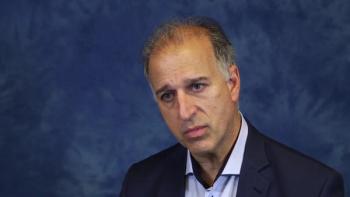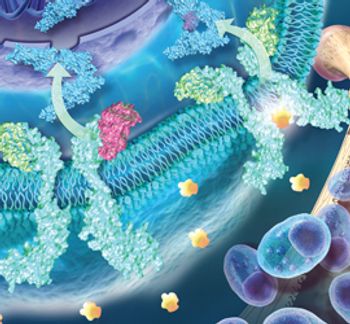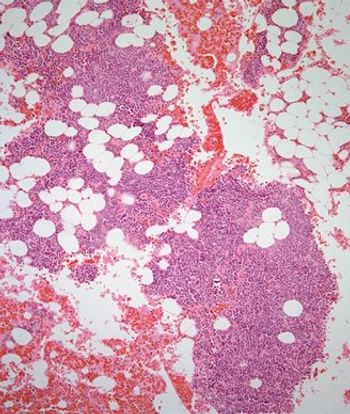
A new study indicates that patients with primary immunodeficiency diseases may be at a much higher risk for certain cancers, especially lymphoma.

Your AI-Trained Oncology Knowledge Connection!


A new study indicates that patients with primary immunodeficiency diseases may be at a much higher risk for certain cancers, especially lymphoma.

This video highlights novel approaches using immunotherapies and vaccines for advancing treatment in multiple myeloma.

Arsenic trioxide consolidation was well tolerated in pediatric patients with acute promyelocytic leukemia and allowed for significant reductions in cumulative anthracycline doses.

Patients with chronic myeloid leukemia in the blast phase pose a significant therapeutic challenge and have poor survival, even in the tyrosine kinase inhibitor era, according to a new study.

In this interview with Charlotte Pawlyn, MB, BChir, PhD, she discusses results of the Myeloma XI study, which tested a novel quadruplet therapy for patients with newly diagnosed multiple myeloma.

The US Food and Drug Administration has approved the tyrosine kinase inhibitor ibrutinib (Imbruvica) for adult patients with chronic graft vs host disease who have failed on one or more lines of prior systemic therapy.

The FDA has approved a fixed combination of daunorubicin and cytarabine (Vyxeos) for the treatment of newly diagnosed therapy-related acute myeloid leukemia (AML) as well as AML with myelodysplasia-related changes.

The FDA has approved enasidenib (Idhifa) for the treatment of relapsed or refractory IDH2-mutant acute myeloid leukemia.

Dose optimization of nilotinib is feasible and may help patients with chronic-phase chronic myeloid leukemia achieve molecular responses, according to results of a new study.

A lower dose of rabbit anti–T-lymphocyte globulin was superior to a higher dose in children with hematologic malignancies undergoing transplant from an unrelated donor.

The FDA has approved the marketing of a new lab test used with flow cytometry to aid in the detection of several types of hematologic malignancies.

A large genomic sequencing analysis of patients with T-ALL revealed a new landscape of mutations that may inform future treatment strategies.

Treatment with imatinib results in good overall survival in patients with chronic myeloid leukemia, approaching a normal life expectancy, according to the CML-IV study.

The FDA has granted priority review status for two new indications of dasatinib (Sprycel), according to the drug’s developer.

Treatment of adult relapsed or refractory acute lymphoblastic leukemia with inotuzumab ozogamicin was associated with increased hepatotoxicity, especially after follow-up hematopoietic stem cell transplantation.

The FDA placed a clinical hold on three trials of the PD-1 inhibitor pembrolizumab in combination with pomalidomide or lenalidomide for patients with multiple myeloma.

In this review, we demonstrate the evolving landscape of clinical investigation as researchers and clinicians attempt to address the important therapeutic needs of patients with myeloproliferative neoplasms.

The FDA has expanded the approval of blinatumomab (Blincyto) for the treatment of relapsed or refractory B-cell precursor acute lymphoblastic leukemia in adults and children.

ODAC approval of Novartis' CAR T-Cell therapy paves the way for its FDA approval as a commercially available treatment for B-cell ALL.

Patients with high-risk diffuse large B-cell lymphoma had a reduced risk of treatment failure, but no survival improvement, with an abbreviated course of rituximab-dose-dense chemotherapy plus high-dose chemotherapy and transplant compared with a full course of chemotherapy.

Treatment with the combination of daratumumab plus pomalidomide/dexamethasone resulted in rapid, deep, and sustained responses with no new safety signals in patients with heavily treated multiple myeloma.

Calcium and vitamin D supplementation had a protective effect against hematologic malignancies, according to a post-hoc analysis of data from the Women’s Health Initiative Calcium/Vitamin D study.

This video reviews different strategies for maintenance therapy in mantle cell lymphoma, as well as highlighting upcoming research in this setting.

There was no significant survival difference in newly diagnosed acute myeloid leukemia patients given induction therapy with idarubicin vs high-dose daunorubicin.

A follow-up analysis of the CheckMate-205 clinical trial found that nivolumab was associated with durable response rates in adults with relapsed or refractory Hodgkin lymphoma after ASCT.